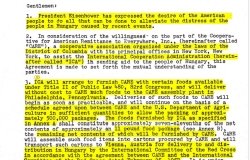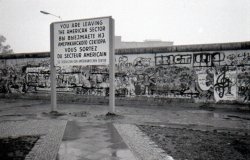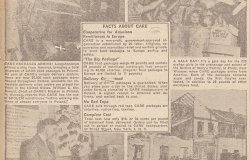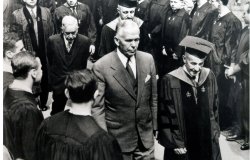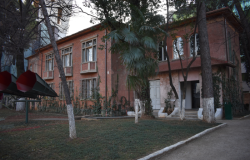The Securitate Files: Silviu Brucan and the Communist Regime in Romania in the 1980s
Radu Ioanid, U.S. Holocaust Memorial Museum, Gheorghe Campeanu, international banking consultant, and Mircea Raceanu, retired Romanian diplomat
Overview
The collapse of communism in Romania in 1989 was the final result of the social and economic turmoil that characterized Romania in the late 1980s. Romanian communist party activist Silviu Brucan played an important role in opposing Nicolae Ceausescu's regime, and his Securitate (Romanian secret police) file reads like an X-ray of Romania during this pivotal time-period.
 Underlining the fact that his views were solely his own and not necessarily those of the U.S. Holocaust Memorial Museum, Radu Ioanid, co-editor of The Brucan File: Documents from the 3rd Directorate of Counterespionage of the State Security Department (1987-1989), described Silviu Brucan as a highly successful Romanian Communist Party apparatchik. He served as Romania's first ambassador to the U.S. and UN, and later as director of Romanian television. Yet, aside from his successful early career, Brucan was otherwise unremarkable until he became actively critical of Ceausescu in the late 1980s.
Underlining the fact that his views were solely his own and not necessarily those of the U.S. Holocaust Memorial Museum, Radu Ioanid, co-editor of The Brucan File: Documents from the 3rd Directorate of Counterespionage of the State Security Department (1987-1989), described Silviu Brucan as a highly successful Romanian Communist Party apparatchik. He served as Romania's first ambassador to the U.S. and UN, and later as director of Romanian television. Yet, aside from his successful early career, Brucan was otherwise unremarkable until he became actively critical of Ceausescu in the late 1980s.
Brucan's criticism culminated in the 1989 publication of the Scrisoarea celor sase (The Letter of the Six)—an open letter critical of Nicolae Ceausescu signed by six high-ranking members of the Romanian Communist Party, including Brucan, and broadcast on Radio Free Europe and Voice of America. Despite the fact that the six signatories were arrested and harshly interrogated immediately following the letter's broadcast, none of them renounced the letter or turned against their co-signers.
 Gheorghe Campeanu, with whom Ioanid co-edited The Brucan File, stated that while Ioanid could take a ‘forensic' approach to the file, his own long association with Brucan prevented him from achieving this level of detachment. While Campeanu did not excuse Brucan for supporting the Romanian Communist Party's repressive activities in the late 1940s and 1950s, he became "very fond of the man" in the 1980s in spite of the fact that they continued to disagree on some issues.
Gheorghe Campeanu, with whom Ioanid co-edited The Brucan File, stated that while Ioanid could take a ‘forensic' approach to the file, his own long association with Brucan prevented him from achieving this level of detachment. While Campeanu did not excuse Brucan for supporting the Romanian Communist Party's repressive activities in the late 1940s and 1950s, he became "very fond of the man" in the 1980s in spite of the fact that they continued to disagree on some issues.
The origins and purpose of the Letter of the Six remains a matter of controversy in Romania. According to Campeanu, Brucan began work on the letter during the summer of 1988 while they shared Campeanu's New York City apartment. Though the letter did criticize Ceausescu and advocated for change in Romania's government, Brucan remained a staunch communist until his death, and his aim therefore was to advocate for reforms within the structure of Romania's then-communist government.
 Mircea Raceanu, a retired Romanian diplomat, described the evolution of Brucan's career and ideological views. Though initially a very committed Marxist, by the mid-1960s he came to feel that communism was not being implemented as intended and that the system required reform. A bargain between Ceausescu and Brucan which became known to Raceanu thanks to his position in the Foreign Ministry allowed Brucan to travel the world and air these opinions throughout the 1960s, 70s, and 80s—so long as he never spoke critically of Romania or especially of Ceausescu himself. An initial violation of this bargain in 1978 resulted in Brucan being denied permission to travel for over one year. Intervention on the part of the U.S. Embassy in Bucharest, then U.S. Secretary of State Alexander Haig, as well as Brucan's promise to abide by the original understanding, eventually gained him permission to travel once again. By the late 1980s, however, Brucan became deeply involved with other marginalized communist figures like Apostol and Manescu who openly opposed Ceausescu's regime.
Mircea Raceanu, a retired Romanian diplomat, described the evolution of Brucan's career and ideological views. Though initially a very committed Marxist, by the mid-1960s he came to feel that communism was not being implemented as intended and that the system required reform. A bargain between Ceausescu and Brucan which became known to Raceanu thanks to his position in the Foreign Ministry allowed Brucan to travel the world and air these opinions throughout the 1960s, 70s, and 80s—so long as he never spoke critically of Romania or especially of Ceausescu himself. An initial violation of this bargain in 1978 resulted in Brucan being denied permission to travel for over one year. Intervention on the part of the U.S. Embassy in Bucharest, then U.S. Secretary of State Alexander Haig, as well as Brucan's promise to abide by the original understanding, eventually gained him permission to travel once again. By the late 1980s, however, Brucan became deeply involved with other marginalized communist figures like Apostol and Manescu who openly opposed Ceausescu's regime.
Despite Brucan's longstanding belief that reform was necessary, Raceanu countered Campeanu's assertion that Brucan initiated work on the Letter of the Six. According to Raceanu, the idea behind the 1989 open letter opposing Ceausescu's policies came from Gheorghe Apostol—another prominent Romanian communist and co-signer of the letter. Even following the collapse of Romania's communist government, Raceanu averred, Brucan remained an ardent communist and an opponent of Romania's democratization during the 1990s.
Drafted by Tim McDonnell
Dr. Christian Ostermann, Director, HAPP/WES
Hosted By

Cold War International History Project
The Cold War International History Project supports the full and prompt release of historical materials by governments on all sides of the Cold War. Through an award winning Digital Archive, the Project allows scholars, journalists, students, and the interested public to reassess the Cold War and its many contemporary legacies. It is part of the Wilson Center's History and Public Policy Program. Read more

History and Public Policy Program
The History and Public Policy Program makes public the primary source record of 20th and 21st century international history from repositories around the world, facilitates scholarship based on those records, and uses these materials to provide context for classroom, public, and policy debates on global affairs. Read more
Thank you for your interest in this event. Please send any feedback or questions to our Events staff.
